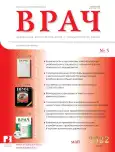Risk factors for recurrence and severity of an ulcerative colitis attack
- Authors: Bolotova E.V1, Yumukyan K.A1,2, Dudnikova A.V1, Yakovenko M.S2
-
Affiliations:
- Kuban State Medical University, Ministry of Health of Russia
- Research Institute - S.V. Ochapovsky Territorial Clinical Hospital One
- Issue: Vol 33, No 5 (2022)
- Pages: 40-45
- Section: From Practice
- URL: https://journals.eco-vector.com/0236-3054/article/view/114618
- DOI: https://doi.org/10.29296/25877305-2022-05-08
- ID: 114618
Cite item
Abstract
Objective. To analyze risk factors for recurrence and severity of an ulcerative colitis (UC) attack. Material and methods. A retrospective study that included 315 medical records of UC patients (167 and 148 Inpatient and outpatient records, respectively) was conducted. Results. Patients with recurrent UC requiring hospitalization were observe to have statistically significantly increases In the duration of the disease, in the frequency of exacerbations/exacerbations in their history and the frequency of using biological agents, a younger age at the onset of UC, alow status of current smoking and ex-smoklng as compared with those in patients In remission. Severe UC was associated with the following factors: a young age at the onset of UC; a lower body mass index, a history of biological therapy; a positive fecal occult blood test at the time of hospitalization; lower hemoglobin and albumin levels; higher erythrocyte sedimentation rate and C-reactive protein; a large extent of intestinal damage; and deep ulcerative defects in the colon mucosa. Conclusion. Analysis of risk factors for recurrence and severity of an UC attack aids In the personalization of treatment, In the prediction of therapeutic response, In the evaluation of the likelihood of adverse effects, and in the optimization of the early diagnosis of the risk of relapse In UC and Its severe attack.
Full Text
About the authors
E. V Bolotova
Kuban State Medical University, Ministry of Health of Russia
Author for correspondence.
Email: avdudnikova@yandex.ru
Professor
K. A Yumukyan
Kuban State Medical University, Ministry of Health of Russia; Research Institute - S.V. Ochapovsky Territorial Clinical Hospital One
Email: avdudnikova@yandex.ru
A. V Dudnikova
Kuban State Medical University, Ministry of Health of Russia
Email: avdudnikova@yandex.ru
Candidate of Medical Sciences
M. S Yakovenko
Research Institute - S.V. Ochapovsky Territorial Clinical Hospital One
Email: avdudnikova@yandex.ru
Candidate of Medical Sciences
References
- Holvoet T., Lobaton T., Hindryckx P. Optimal Management of Acute Severe Ulcerative Colitis (ASUC): Challenges and Solutions. Clin Exp Gastroenterol. 2021; 14: 71-81. doi: 10.2147/CEG.S197719
- Gallo G., Kotze P.G., Spinelli A. Surgery in ulcerative colitis: When? How? Best Pract Res Clin Gastroenterol. 2018; 32-33: 71-8. doi: 10.1016/j.bpg.2018.05.017
- Тертычный А.С., Ахриева Х.М., Маев И.В. и др. Проблемы диагностики гистологической ремиссии у больных с воспалительными заболеваниями кишечника. Архив патологии. 2017; 79 (3): 3-9. doi: 10.17116/patol20177933-9
- Ивашкин В.Т., Шелыгин Ю.А., Абдулганиева Д.И. и др. Рекомендации Российской гастроэнтерологической ассоциации и Ассоциации колопроктологов России по диагностике и лечению взрослых больных язвенным колитом. Российский журнал гастроэнтерологии, гепатологии, колопроктологии. 2015; 25 (1): 48-65.
- Frolkis A.D., Dykeman J., Negron M.E. et al. Risk of surgery for inflammatory bowel diseases has decreased over time: a systematic review and meta-analysis of population-based studies. Gastroenterology. 2013; 145 (5): 996-1006. doi: 10.1053/j.gastro.2013.07.041
- Lamb C.A., Kennedy N.A., Raine T. et al. British Society of Gastroenterology consensus guidelines on the management of inflammatory bowel disease in adults [published correction appears in Gut. 2021; 70 (4): 1]. Gut. 2019; 68 (3): s1-s106. doi: 10.1136/gutjnl-2019-318484
- Mathurin F. et al. Natural History of Adult Ulcerative Colitis in Population-based Cohorts: A Systematic Review. Clin Gastroenterol Hepatol. 2018; 16 (3): 343-356.e3. DOI: 10.1016/j. cgh.2017.06.016
- Bopanna S., Ananthakrishnan A N., Kedia S. et al. Risk of colorectal cancer in Asian patients with ulcerative colitis: a systematic review and meta-analysis. Lancet Gastroenterol Hepatol. 2017; 2 (4): 269-76. doi: 10.1016/S2468-1253(17)30004-3
- Kotze P.G., Steinwurz F., Francisconi C. et al. Review of the epidemiology and burden of ulcerative colitis in Latin America. TherAdv Gastroenterol. 2020; 13:1756284820931739. doi: 10.1177/1756284820931739
- Бикбавова Г.Р., Ливзан M.A, Новиков Д.Г. и др. Прецизионная медицина и воспалительные заболевания кишечника: концепция, стратегии, будущее. Экспериментальная и клиническая гастроэнтерология. 2021; 1 (6): 121-9. D01:10.31146/1682-8658-есд-190-6-121-129
- Kucharzik Т., Koletzko S., Kannengiesser К. et al. Ulcerative Colitis-Diagnostic and Therapeutic Algorithms. Dtsch Arztebl Int. 2020; 117 (33-34): 564-74. DOI: 10.3238/ arztebl.2020.0564
- Oh S.J., Shin G.V., Soh H. et al. Long-term outcomes of infliximab in a real-world multicenter cohort of patients with acute severe ulcerative colitis.Intest Res. 2021; 19 (3): 323-31. doi: 10.5217/ir.2020.00039
- Lau A., Chande N. PonichT. etal. Predictive factors associated with immunosuppressive agent use in ulcerative colitis: a case-control study. Aliment Pharmacol Ther. 2008; 28 (5): 606-13. doi: 10.1111/j.1365-2036.2008.03772j<
- Tanaka М., Takagi Т., Naito Y. et al. Low serum albumin at admission is a predictor of early colectomy in patients with moderate to severe ulcerative colitis. JGH Open. 2021; 5 (3): 377-81. doi: 10.1002/jgh3.12506
- Wagatsuma К Yokoyama Y., Nakase H. Role of Biomarkers in the Diagnosis and Treatment of Inflammatory Bowel Disease. Life (Basel). 2021; 11 (12): 1375. DOI: 10.339(Уlifel 1121375
- Kato J., Yoshida Т., Hiraoka S. Prediction of treatment outcome and relapse in inflammatory bowel disease. Expert Rev Clin Immunol. 2019; 15 (6): 667-77. doi: 10.1080/1744666X 2019.1593140
- Burisch J., Ungaro R., Vind I. et al. Proximal Disease Extension in Patients With Limited Ulcerative Colitis: A Danish Population-based Inception Cohort J Crohns Colitis. 2017; 11 (10): 1200-4. doi: 10.1093/ecco-jcc/jjx066
Supplementary files





